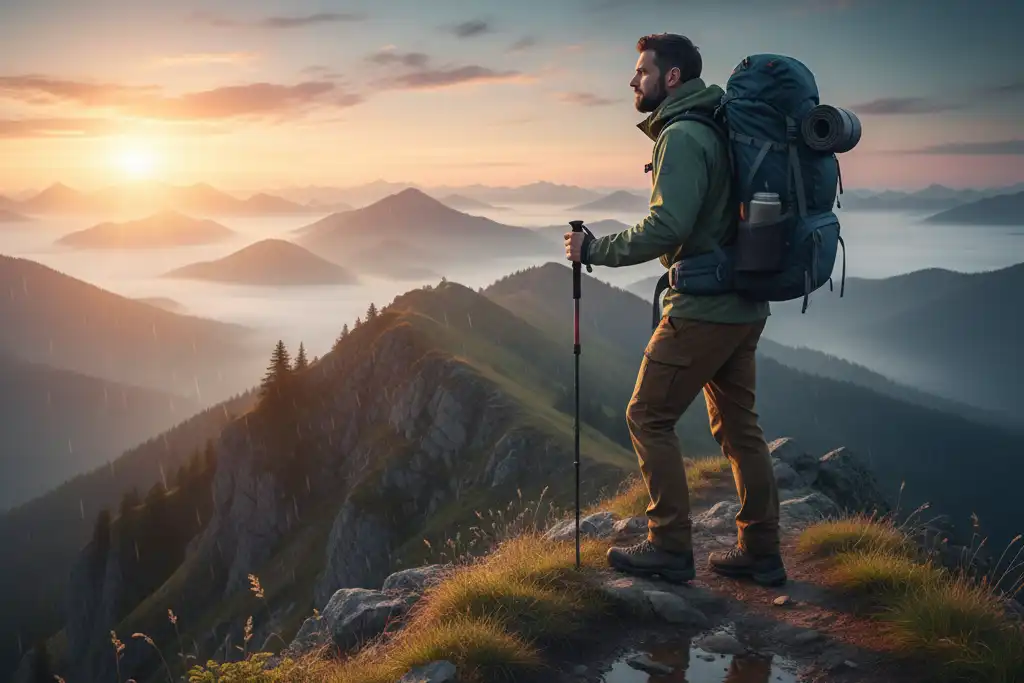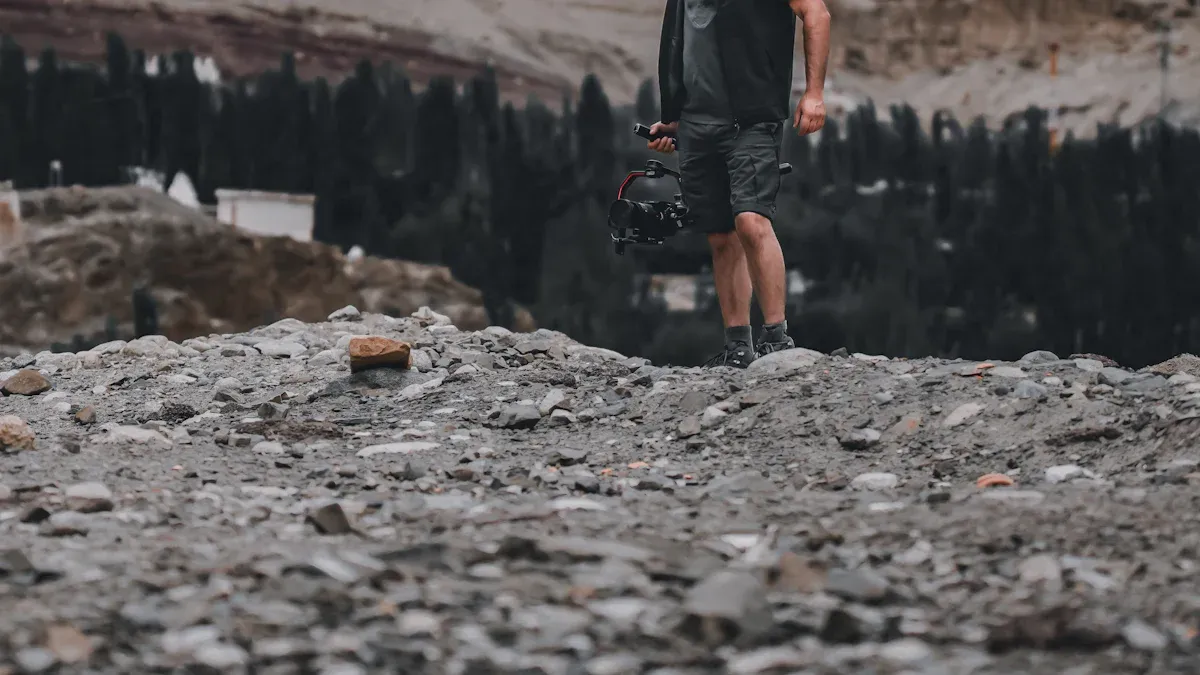What is The Most Surprising Thing You Discovered While Hiking

You probably expect fresh air and untouched nature on your next hiking experience. Imagine reaching a sparkling mountain lake, dipping your hand in the water, and spotting tiny plastic bits floating on the surface. You feel shocked. You thought remote places stayed clean, but scientists found high levels of microplastics in lakes like Lake Tear of the Clouds. Your heart sinks as you realize even your boots might leave a mark.
Key Takeaways
- Microplastics are even in faraway places. This shows our actions affect nature. Always look at your gear. Try to stop pollution.
- Hiking is not only about pretty views. It is also about meeting other hikers. Share your stories and learn from others. This makes your trip better.
- Be ready for surprises on hikes. Surprises can help you grow. They make you value nature more.
- Walk slowly on the trail. Enjoy every part of your hike. Each step lets you learn and think.
- Get ready for anything. Make a plan for your trip. Check the weather before you go. Pack what you need for a safe hike.
Setting
The Trail
You step onto the trail, boots crunching on gravel. The air feels crisp, and the trees stand tall around you. Sometimes, you find yourself in places that seem untouched by people. You might walk through a thick forest, cross a rocky stream, or climb a steep hill. Each trail has its own story. Some trails surprise you with their wildlife. For example:
- In Pune, India, hikers spotted a dhole, an Asiatic wild dog, where no one expected it.
- In the YSR Kadapa district, people found the Kalivikodi bird, a species thought extinct for decades.
- Rediscovering rare animals reminds you how important it is to protect these wild places.
You never know what you might see. Sometimes, you meet other hikers who share their stories. You might sit around a campfire, swapping tales and snacks. On the Appalachian Trail, hikers like Moses tell stories that make you laugh or think. These moments show that the trail is not just about nature. It is also about the people you meet along the way.
Every trail has its own surprises. Some come from the land, others from the people you meet.
Expectations
Before you start your hiking experience, you probably imagine clear skies, fresh air, and maybe a few birds singing. You pack your bag, check your map, and think you are ready for anything. Most hikers feel this way. They believe they can prepare for every challenge. But the truth is, no amount of planning can cover everything. Hikers on the John Muir Trail say that surprises always pop up. You might see an animal you never expected or find the trail washed out after a storm.
You also discover that local culture shapes your journey. Sometimes, you meet people from nearby villages who share their food or stories. These moments help you see the world in a new way. Hiking with a cultural focus lets you learn about the land and its people. You realize that every region has its own surprises, both big and small.
The Moment

Discovery
You walk along the narrow path, feeling the cool breeze on your face. The trees sway gently, and you hear the soft crunch of leaves under your boots. The air smells fresh, almost sweet, with a hint of pine. You reach a clearing and spot a small lake, its surface shining in the sunlight. You kneel down, eager to touch the water. As your hand dips in, you notice something strange. Tiny bits of plastic float near the shore. They glint in the light, mixed with pebbles and leaves.
You pause, surprised. You thought this place was untouched. The lake sits far from any road or town. You wonder how these plastic pieces got here. You remember reading that even remote places can show signs of human activity. Hikers, like you, might bring microplastics on their shoes or gear. Each step can leave a mark, even if you do not see it right away. This moment changes how you see your hiking experience. You realize that every visit, every footprint, can shape the land in ways you never expected.
The sounds around you grow louder. Birds call from the trees. Water laps gently at the shore. The smell of wet earth fills your nose. These sensory details make the discovery feel even more real. The lake, once a symbol of purity, now tells a different story. You feel connected to the place, but also responsible for its future.
Emotions
You feel a rush of emotions. At first, you feel shock. You did not expect to find plastic in such a wild spot. Then, you feel anger. How could this happen here? You think about other hikers who might not care or notice. You feel frustrated, just like others who have found signs of pollution in remote areas.
- You feel sad that nature is not as untouched as you hoped.
- You feel angry that people can harm places without even knowing it.
- You feel a sense of responsibility to do better on your next hiking experience.
You stand up and look around. The beauty of the place still takes your breath away, but now you see it with new eyes. The sounds and smells seem sharper. The water looks different. You realize that every sense helps you understand the world in a deeper way. Your hiking experience has changed in just a few moments. You carry this feeling with you as you continue down the trail.
Hiking Experience Impact
Perspective Shift
You might think a hike is just a walk in the woods. After your surprising discovery, everything changes. You start to notice small things you missed before. The sound of birds, the feel of the wind, and the crunch of leaves under your boots all seem sharper. You realize that every step matters. You see how your actions can affect even the most hidden places.
Many hikers say that unexpected moments lead to big changes in how they see the world. You may feel pain or discomfort, but you learn to accept it. Some hikers use tricks like focusing on the good parts, playing mental games, or just taking things one minute at a time. You might even start to look for awe in nature, pausing to enjoy the view or listen to the sounds around you.
Hiking Experience can help you find meaning and purpose, no matter your age or skill level.
Here’s a look at how different age groups feel about transformative hikes:
| Age Group | Number of Respondents |
|---|---|
| 18-34 | 21 |
| 35-64 | 38 |
Most hikers, young or old, say that hiking gives them a sense of well-being. You might feel stronger, happier, or more connected to nature after a tough hike.
Connection
You do not hike alone, even if you walk by yourself. Shared surprises on the trail can bring people together. You might meet someone who saw the same thing or felt the same shock. These moments help you bond with other hikers. You share stories, laugh about tough times, and learn from each other.
- Hiking Experience often leads to new friendships.
- Families who hike together feel closer.
- Community groups, like nature clubs, help people connect and support each other.
You start to see yourself as part of a bigger story. You join a tradition of adventurers who care about the land and each other. You learn that every hike is a chance to grow, connect, and make a difference.
Lessons
Insights
You learn a lot from a surprising moment on the trail. Some lessons stick with you long after you finish your hike. Here are a few that many hikers mention:
- Move slowly. Don’t rush or you could get hurt.
- Don’t focus only on the end. Enjoy the journey.
- Sometimes, you have no choice but to keep going.
- Always know your next step and pay attention.
- Hiking relaxes you.
- It’s okay to sweat. It’s okay to smell.
- Weather can change fast and be unforgiving.
- Know what’s important to bring and what you can leave behind.
Challenging hikes often bring out strong emotions. You might struggle, feel proud, or spend time thinking about your life. These feelings make the experience deeper than a simple walk in the park. When you face a false summit or a tough climb, you learn more about yourself. You see that a Hiking Experience can change how you see the world.
You are not alone in this. Ken from Kansas City found a new fruit, the papaw, and shared it with his kids. Jack from South Carolina met wild animals and felt a new respect for nature. Katherine from Charlotte set goals on the trail and grew as a person. Their stories show how hiking can lead to big changes.
Advice
“When I think about lessons learned from my time on the A.T. I realize that the biggest lesson that I learned is to EXPECT the UNEXPECTED.” — Leanna “All Good” Keegan
You never know what you will find on the trail. Here are some tips to help you get ready for anything:
- Leave a trip plan with someone you trust. Tell them your route and when you plan to return.
- Make an emergency plan. Learn basic first aid and what to do if you get lost or hurt.
- Check the weather before you go. Bring rain gear and know how to find shelter.
- Never be afraid to ask for help. Other hikers want to help you, just like William Davis learned after his injuries.
Stay open to surprises. Every hike teaches you something new.
You never forget the moment you spot something unexpected on the trail. That surprise can change how you see nature and yourself.
Lugo’s journey inspired him to protect wild places and admire how nature heals itself, even in decay.
You might find new strength, learn to trust yourself, or care less about what others think.
- Hiking helps you unplug, reset, and feel more mindful.
- Nature’s beauty and challenges reveal what matters most.
Let yourself wander. The best memories often come from the surprises you never planned.
FAQ
What should you do if you find trash or plastic on a remote trail?
Pick it up if you can. Carry a small bag for litter. If you see something too big, note the location and tell park staff. Every bit helps keep nature clean.
How can you prepare for surprises while hiking?
- Pack extra water and snacks.
- Bring a map and compass.
- Check the weather before you go.
- Tell someone your plan.
Stay flexible. Surprises make hiking memorable!
Why do you sometimes find pollution in wild places?
Wind, rain, and people can carry trash far from cities. Even your shoes or gear might bring microplastics. Nature connects everywhere, so your actions matter.
How can you help protect nature while hiking?
Stick to marked trails. Take only photos, leave only footprints. Join clean-up hikes or teach friends about Leave No Trace. Small actions add up!
See also
How Hiking Every Day Changes Your Body Over Time
How to Pack for a Long-Distance Hike and What to Pack



Comments are closed